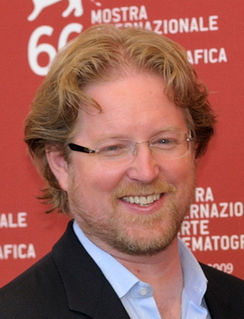A Quote by Andrew Stanton
The way Pixar has always worked is that we think of an idea and then we make it. We don't develop lots of ideas and then pick one.
Related Quotes
Ideas are floating like fish. Desire for an idea is like a bait on a hook. If you desire an idea, it pulls and it makes a kind of a bait. Ideas will come swimming up. And you don't know them until they enter the conscious mind. And then bingo! There it is! You know it instantly. And then more come in. If you go fishing for ideas, a lot of ideas will just pop in. And one of them will make you fall in love.
I never think of an entire book at once. I always just start with a very small idea. In 'Holes,' I just began with the setting; a juvenile correctional facility located in the Texas desert. Then I slowly make up the story, and rewrite it several times, and each time I rewrite it, I get new ideas, and change the old ideas around.
I've learned that if you can keep it calm and keep it fun and loose, then that allows for ideas from the crew. I don't care where an idea comes from, whether it's the crew or my producer or the actors or anybody. I just want it to be fun, and if that's the case, then I think you make a better movie.
I started in the lowest league in baseball, and I worked my way all the way up to Triple A and then to the big leagues. I never reached the level that I thought I would reach as a player. But that's the way it goes. So then I started from the bottom as a manager, and I worked my way up to managing the Dodgers for 20 years.
I’m much better at working out ideas in action than I am in theorizing about it and then transferring my thinking to action. I don’t work that way. I work with tentative ideas and I experiment and then with that experimentation in action, I finally come to the conclusions about what I think is the right way to do it.
If you are only skeptical, then no new ideas make it through to you. You become a crotchety old person convinced that nonsense is ruling the world. (There is, of course, much data to support you.) But every now and then, a new idea turns out to be on the mark, valid and wonderful. If you are too much in the habit of being skeptical about everything, you are going to miss or resent it, and either way you will be standing in the way of understanding and progress.
[A]s soon as you try and take a song from your mind into piano and voice and into the real world, something gets lost and it's like a moment where, in that moment you forget how it was and it's this new way. And then when you make a record, even those ideas that you had, then those get all turned and changed. So in the end, I think, it just becomes it's own thing and really I think a song could be recorded a million different ways and so what my records are, it just happened like that, but it's not like, this is how I planned it from the very beginning because I have no idea, I can't remember.





































